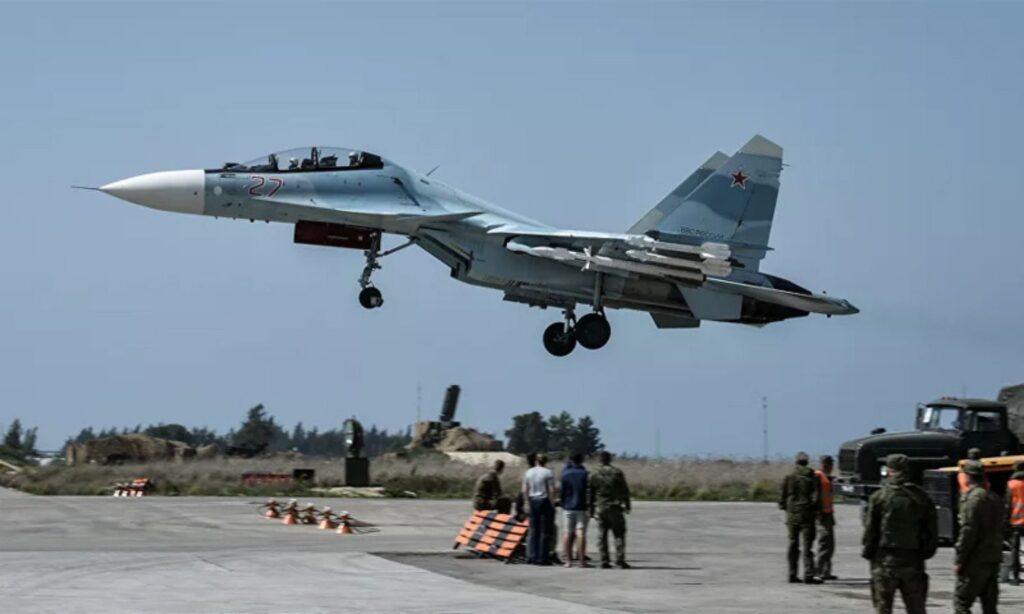The Russian Ministry of Defense announced the start of military air patrols along the disengagement line between Syria and the Golan Heights, occupied by Israel, in southern Syria.
The Deputy Head of the Russian Center for Reconciliation (affiliated with the Ministry of Defense), Admiral Vadim Kulit, stated that the Russian air forces began air patrols along the “Bravo Line” that divides the Golan Heights between Syria and Israel.
According to what was reported by the Russian news agency (TASS) yesterday evening, Thursday, January 18, the objective of the patrols is to monitor the situation along the disengagement line between the two sides.
Kulit said that the aviation units of the Russian Aerospace Forces organized air patrols along the disengagement line known as the “Bravo Line.”
The patrols came days after the Russian Defense Ministry announced the deployment of two new points in the occupied Syrian Golan to monitor the ceasefire between Syria and Israel.
On January 3, Admiral Vadim Kulit stated that his country had established two military points in southern Syria against the backdrop of increasing provocations in the “demilitarized zone.”
TASS reported at the time that the new points were stationed with units of the Russian military police to “monitor the ceasefire.”
After an absence of more than a year, Russia resumed its military patrols in southern Syria at the beginning of November 2023, as a Russian military patrol traveled south of Quneitra between Mualaqah and Ghadir al-Bustan, near the Safra company belonging to the 90th Brigade south of the governorate belonging to the regime’s army.
Enab Baladi’s correspondent in Quneitra reported at the time that a Russian patrol went out on a tour near the borders with the occupied territories and conducted a round inside Safra company.
The Russian patrols had completely disappeared from the region for more than a year after Russia evacuated the Red Hills military position north of the governorate in mid-2021 and has not returned to the area since then.
Israel occupied the Golan Heights in 1967, and the Syrian forces were not allowed to enter the buffer zone as per the 1973 ceasefire agreement.
Over the past years, the Syrian regime accused Israel of supporting opposition factions on the borders of the occupied Golan, especially in the Quneitra countryside and its adjacent areas.
Absence and return
In 2018, the regime regained control of southern Syria with Russian support, known at the time as the “settlement agreement,” which led to the withdrawal of heavy weapons from opposition factions and relocated those who rejected the “settlement” towards the last opposition stronghold in northwest Syria.
During the same period, the regime forces returned to their positions near the borders with the occupied Golan Heights, while Russia positioned itself in areas of the Quneitra and Daraa governorates, then withdrew from them with the onset of its war in Ukraine.
In a previous conversation with Enab Baladi, a leader in the Eighth Brigade, which was formed by Russia in southern Syria, said that the Russian invasion of Ukraine marked the beginning of the decline of the Russian presence in the south as the support gradually receded from the Brigade and the salaries of its members were completely stopped. Even the visits of the Russian military police to Busra al-Sham became rare and then completely ceased.
The Russian withdrawal from the south of Syria opened the door for Iranian militias to infiltrate the area, leaving it exposed to repeated targeting by the Israeli army, as Israel repeatedly bombed the area, targeting members of these militias.
Since the launch of the Islamic Resistance Movement (Hamas) operation “Aqsa Flood” in the Gaza Strip’s periphery and Hezbollah’s engagement on the southern front of Lebanon, the southern front in Syria with Israel has witnessed repeated rocket launches towards Israeli settlements in the occupied Golan.
The Israeli air force and artillery continued to respond to these rockets by targeting their source in southern Syria, and some went further, as Israel repeated its bombing of military sites of the regime’s army in Daraa, Quneitra, and As-Suwayda provinces in response to the launching of these rockets.











